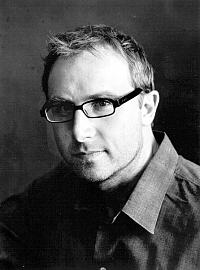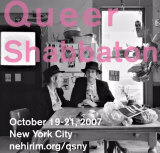 April 08
April 08
The Russification of Jewish-American Fiction
by Andrew Furman
p. 2 of 2
If Bezmozgis and his peers tangibly evoke this intergenerational angst, they also evoke the fierce, singular love of immigrant children for their parents, the rich loamy soil from which such guilt springs. Consider our young hero’s grief in Bezmozgis’s “Choynski”–a depth of feeling that catches him by surprise–upon the passing of his aged grandmother. “Babushka, babusha, g’dye tih, maya bubushka? . . . where are you, my babushka?” our narrator cries at the cemetery the night of his grandmother’s funeral, wallowing in the snow. And here’s Misha Vainberg, the hero of Shteyngart’s Absurdistan, on his beloved papa: “I recalled how my little body felt when encased in his, his wise brown eagle eyes eating me up, the worsted bristles of his mustache giving my cheeks a manly rash I would treasure for days. . . .The trickle of Papa’s deep vodka breath against my neck, the hairy obstinate arms pressing me into his carpet-thick chest, the animal smells of survival and decay–this is my womb.”
There’s something about sex and these Russians too. Remember when sex in Jewish-American fiction was shrouded in mystery, dangerous, even horrifying? Remember the lascivious, stale suitors of Anzia Yezierska’s Bread Givers (1925), reeking of herring and ill-intent? Remember David Schearl’s sordid, dark closet initiation into the realm of euphemistic “pretzels” and “knishes” in Henry Roth’s Call it Sleep (1934)? Remember the back-alley pederasts stalking Bellow’s young protagonists in Montreal and Chicago? In a different vein, remember the coital excess of Roth’s protagonists? (I suppose we need only go back to 1995 for Sabbath’s Theater.) The carnal realm in Jewish-American fiction, a few notable exceptions aside, has largely been neutered in recent years, a plot device often glossed over with the double-space break. Cut to the next scene! When Shteyngart’s Girshkin from his debut novel satirizes the “gentle and sympathetic Antioch College-type sex–the sex by committee of two, the insertion of the penis first a quarter of the way, then in gradual increments,” he might as well be satirizing the timid and tame engagement with sexuality that characterizes much contemporary Jewish-American fiction.
 |
|---|
Ellen Litman |
As if in response to this cooling of temperament, Shteyngart’s novels overbrim with earthy, mischievous sex. Moreover, sexual mystery and danger permeates the works of our other new Russian Jewish-American writers. I’m thinking, specifically, of Vapnyar’s story, “Lydia’s Grove,” in which the love that dare not speak its name (not that there’s anything wrong with it!) breaks our child protagonist’s already tenuous foothold on a more exalted, cultured existence in the Soviet Union. Or Litman’s “The Trajectory of Frying Pans,” in which our male narrator reflects upon the “courageous acts of love–fake love, green card love,” to which he suspects that his increasingly sad and remote (and pregnant) coworker has succumbed. I’m thinking of Sasha Goldberg’s masturbation in the back of a deserted Asbestos 2 bus in Petropolis, her hungry, perilous (and consequential) couplings at fourteen with her friend’s dissolute brother. Finally, sexual bartering and exploitation crop up all over Bezmozgis’s Natasha. In “Roman Berman, Massage Therapist,” our young protagonist’s father is creepily compelled to administer a therapeutic massage to the topless wife of a would-be Jewish benefactor in her bathroom. “Tell me, what am I supposed to do?” he asks his son, who has intruded upon the scene. In the title story, “Natasha,” our hero’s promiscuous cousin, newly arrived from the Soviet Union, world-weary at fourteen (what is it about fourteen and these Russian girls?), initiates him into the carnal realm–exciting at first, but on Natasha’s desperate terms increasingly bleak, rapacious, and mean.
How to explain this return of sex as primal threat, or treat, among these new writers? It has something to do, surely, and depending upon the specific tale, with poverty and desperation, with the shrouded sexual protocol of a closed, Soviet society, with the exigencies of securing citizenship in the west, with a generation of harried and distracted immigrant parents in the new world, our child-heroes forced to confront realms of adulthood (including the sexual realm) long before most born-here Jews. In any case, the specter of sex looms in much of this work, contributing a renewed frisson of tension, even terror–and sometimes libidinal excess and delight–to these Jewish-American novels and stories.
The depth of feeling. The urgency. The passion. If a century of assimilation and material comfort (relatively speaking) have tended to modulate these outsized emotions from our felt lives and from much of our prose, the Russians among us have reclaimed these artistic virtues, summoning to mind the old quip that Jews are just like everyone else, only more so.
Make no mistake. Shteyngart and his peers, who have contributed mightily in bringing the Jewish voice to the center of our literary culture, are good for the Jews. We’re a young country, all things considered, and our national literature has long been unusually rich with tales of becoming American, more so than with being American, per se. By the late twentieth century, we born-here Jews had all but ceded this literary territory to writers of other ethnicities, the most dazzling of late including Jhumpa Lahiri, Edwidge Danticat, Cristina Garcia, Chang Rae Lee, and Kiran Desai. So it’s pretty cool that a new wave of Jewish writers with their own particular migration tale to tell have reclaimed some of this territory for us.
 |
|---|
David Bezmozgis |
Jews, let’s remember, weren’t always so . . . well, white in this country. To wit, the Russian immigrant in Yezierska’s “Soap and Water,” collected in Hungry Hearts (1920), chafes against the Dean of her teaching college, the illustratively named Miss Whiteside, who fears that our immigrant heroine will never scrub clean the taint of her Jewish race. Through soap and water, however, our protagonist successfully enters the realm of the clean, American (read: white) society by the end of the story. Indeed, Ashkenazi Jews, like other Euro-American ethnics, more or less became “white” over the twentieth century, and membership has had its privileges. So it’s especially intriguing that so many of the stories and novels by the Russian writers stake claim once again to a non-white Jewish identity. I’m thinking of Masha’s affinity with her Indian-American and Chinese-American immigrant peers in Litman’s “Russian Club”; or her immigrant adolescents in another story, “dressed to look like homeboys, with their pants low off their asses, saggin’.” Shteyngart’s Vainberg, and Absurdistan, generally, is fairly drenched in the streetwise, protesting spirit of hip-hop. “[A]s far as I can tell, all of you Russians are just a bunch of niggaz,” Vainberg’s Latina girlfriend tells him. Everything about Vainberg–not least of all his sexual preference for darker, larger women (no blonde waifs for him)–bespeaks his, and Shteyngart’s, rejection of conventional, white American mores. As if to trump her cohorts, Ulinich creates a “real” nigga’ in Sasha Goldberg, granting her protagonist an African grandfather, “something stronger,” as one character in Petropolis puts it, than mere Russian or Jewish blood. In the Russian army, Sasha’s father must endure curses like “Your mama fucked a monkey” in addition to “Get the Jew,” and Sasha also endures both anti-black racism and antisemitism in Russia and in the United States. Read against the backdrop of earlier Jewish-American writing, these new stories and novels offer a virtual (and fruitful) case study on the ever-shifting, social construction of race, and betray the tenuous, liminal position that Jews occupy in our increasingly global and multicultural zeitgeist. Any Ethnic Studies program worth its salt will include Petropolis and Absurdistan–both of which engage foursquare with these issues–in its standard curricula.
To be sure, such cultural marginality, such exotic otherness, carries a definite cache in our current academic realm and in the mainstream readerly realm. Whereas Yezierska’s heroine must assure the Miss Whitesides of the world–and early twentieth century American readers–that she’ll clean up her act and become white, contemporary writers in America gain greater traction through exerting their distinct, immigrant otherness (which is somewhat odd, perhaps, given our country’s increasingly nativist, Lou Dobbs temperament). It’s probably no accident that three of the most popular novels of 2007 written by born-here Jewish-American writers–Michael Chabon’s The Yiddish Policemen’s Union, Amy Bloom’s Away, and Nathan Englander’s The Ministry of Special Cases–revisit immigrant times and climes, even a wholly imaginary, fantastical immigrant outpost in Chabon’s case. Nor is it an accident that the book jacket of Petropolis assures its readers that Sasha Goldberg is “the ultimate outsider.” It may be that our Russian peers call upon more immediate resources to tap into this enthusiasm for exotic locales and immigrant characters. I say bring it on. Power to the (Jewish) people!
If born-here Jewish critics and writers greet our Russification with somewhat guarded euphoria, it’s only because the movement’s success threatens to reinforce that longstanding, reductive notion that the immigrant experience alone, that Jewish cultural and racial marginality alone, constitute seeing and being Jewish in America. It hasn’t been easy to move beyond the Bellow, Roth, and Malamud generation, especially after Howe and Fiedler had to go pop wise about the death of Jewish American fiction after the fading of the immigrant experience. It would be a shame to have to fight that particular fight all over again.
I suspect that our young Russian Jewish-American writers will face the same challenge in the years ahead that we born-here peers faced, and that we continue to face. After the second, third, maybe fourth imagining of the old world and the immigrant experience, will they locate Jewish sources in the west rich enough to produce a distinctively Jewish art? But here I must check my American readerly sensibilities. For the corollary point might also be argued. That is, why ought these new Jewish writers feel compelled to imagine the American landscape, at all? After the searing Russian prelude of Petropolis, there seems something too abrupt, too forcefully willed, perhaps, about Sasha Goldberg’s subsequent peregrinations through Phoenix (randy, exploitative American male who purchases Sasha mail-order) and Chicago (boorish, exploitative Jewish benefactors), before Ulinich gains her artistic footing once again in Brooklyn, and then back in Russia. To what extent does Ulinich ship her protagonist off to America to fulfill the parochial expectations of an American, and even Jewish American, readership? As these new writers continue to negotiate their inbetweenness, one hopes that they’ll follow their artistic imaginations wherever they happen to roam and that readers will treat their works, and the works of us born-here writers, on their own singular terms. It seems to me that the least we all can expect in the open west is the latitude to conjure whatever fictional realms we desire. So give us your Shteyngarts, your Vapnyars, your Uliniches yearning to riff free. Jewish writing in America is a multi-course feast. Let us dine.
Andrew Furman is a professor of English at Florida Atlantic University. He is the author, most recently, of Alligators May Be Present, a novel. He has published essays on Jewish literature and culture in a number of periodicals, including Poets & Writers, JBooks, the Forward, and The Chronicle of Higher Education.











